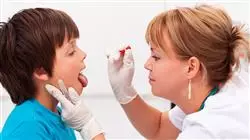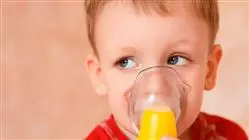University certificate
The world's largest faculty of nursing”
Introduction to the Program
Training and constantly updating the knowledge of nursing professionals is a necessity for them to acquire the knowledge, skills and attitudes that will enable them to care for a child in all their dimensions and at all levels of care”

Children constitute one of the most vulnerable groups in terms of morbidity and mortality, naturally due to the special conditions in which they find themselves during the perinatal stage and infancy, related to the biological processes of reproduction, growth and development.
Prevention, in addition to family education, is essential to maintain the health status of children. Both inpatient and outpatient pediatric services, as well as the professionals working in them, play a fundamental role in pediatric care.
In addition to their general education, nursing professionals who perform their care function in pediatric patient care services must have acquired the necessary knowledge and skills for their daily practice with this type of patient, and it is essential to constantly update this knowledge and skills through adapted teaching programs.
The Pediatric Nursing professional, among their attributions, should be able to provide comprehensive care to children in the different stages of their lives, including all aspects related to the provision of care in the school period up to adolescence and in emergency situations, as well as the management and application of advanced life support techniques.
This Postgraduate diploma in Pediatric Care for Nursing is oriented to enable the physician to incorporate the advances that are taking place in the discipline, in addition to reviewing the most important aspects of emergency care in pediatric patients.
This Postgraduate diploma in Pediatric Care for Nursing contains the most complete and up-to-date scientific program on the market”
This Postgraduate diploma in Pediatric Care for Nursing contains the most complete and up-to-date scientific program on the market. Its most notable features are:
- Clinical cases presented by experts. The graphic, schematic, and practical contents with which they are created, provide scientific and practical information on the disciplines that are essential for professional practice
- Diagnostic and therapeutic innovations in child care. Includes Pediatric Life Support
- Specific sections in each module on nursing techniques and procedures according to the child's age. As well as the management of the main emergencies in pediatrics, such as acute febrile episode, seizures, abdominal pain, rashes, wounds and burns, poisoning, stings and bites, TBI or the management of pediatric cardiorespiratory arrest, based on the latest ILCOR 2015 recommendations
- Video lessons on the different pathologies and their approach
- An algorithm-based interactive learning system for decision-making in the clinical situations presented throughout the course
- Includes theoretical lectures, questions to the expert, discussion forums on controversial issues and individual reflection papers
- Content that is accessible from any fixed or portable device with an Internet connection
This Postgraduate diploma may be the best investment you can make when selecting a refresher program for two reasons: in addition to updating your knowledge of Pediatric Care for Nursing, you will obtain a qualification from TECH Global University"
Its teaching staff includes leading nursing professionals, who contribute the experience of their work to this program, as well as other professionals who specialize in the various fields of caring for children and their families.
The multimedia content developed with the latest educational technology will provide the professional with situated and contextual learning, i.e., a simulated environment that will provide an immersive academic experience programmed to learn in real situations.
This program is designed around Problem-Based Learning, whereby the student will must try to solve the different professional practice situations that arise during the course. For this reason, they will be assisted by an innovative, interactive video system created by renowned and experienced experts in pediatrics with extensive teaching experience.
It includes simulation clinical cases to bring the content of the program closer to everyday practice"

Don't miss the opportunity to update your knowledge in pediatrics to increase the quality of your care"
Why study at TECH?
TECH is the world’s largest online university. With an impressive catalog of more than 14,000 university programs available in 11 languages, it is positioned as a leader in employability, with a 99% job placement rate. In addition, it relies on an enormous faculty of more than 6,000 professors of the highest international renown.

Study at the world's largest online university and guarantee your professional success. The future starts at TECH”
The world’s best online university according to FORBES
The prestigious Forbes magazine, specialized in business and finance, has highlighted TECH as “the world's best online university” This is what they have recently stated in an article in their digital edition in which they echo the success story of this institution, “thanks to the academic offer it provides, the selection of its teaching staff, and an innovative learning method aimed at educating the professionals of the future”
A revolutionary study method, a cutting-edge faculty and a practical focus: the key to TECH's success.
The most complete study plans on the university scene
TECH offers the most complete study plans on the university scene, with syllabuses that cover fundamental concepts and, at the same time, the main scientific advances in their specific scientific areas. In addition, these programs are continuously being updated to guarantee students the academic vanguard and the most in-demand professional skills. In this way, the university's qualifications provide its graduates with a significant advantage to propel their careers to success.
TECH offers the most comprehensive and intensive study plans on the current university scene.
A world-class teaching staff
TECH's teaching staff is made up of more than 6,000 professors with the highest international recognition. Professors, researchers and top executives of multinational companies, including Isaiah Covington, performance coach of the Boston Celtics; Magda Romanska, principal investigator at Harvard MetaLAB; Ignacio Wistumba, chairman of the department of translational molecular pathology at MD Anderson Cancer Center; and D.W. Pine, creative director of TIME magazine, among others.
Internationally renowned experts, specialized in different branches of Health, Technology, Communication and Business, form part of the TECH faculty.
A unique learning method
TECH is the first university to use Relearning in all its programs. It is the best online learning methodology, accredited with international teaching quality certifications, provided by prestigious educational agencies. In addition, this disruptive educational model is complemented with the “Case Method”, thereby setting up a unique online teaching strategy. Innovative teaching resources are also implemented, including detailed videos, infographics and interactive summaries.
TECH combines Relearning and the Case Method in all its university programs to guarantee excellent theoretical and practical learning, studying whenever and wherever you want.
The world's largest online university
TECH is the world’s largest online university. We are the largest educational institution, with the best and widest online educational catalog, one hundred percent online and covering the vast majority of areas of knowledge. We offer a large selection of our own degrees and accredited online undergraduate and postgraduate degrees. In total, more than 14,000 university degrees, in eleven different languages, make us the largest educational largest in the world.
TECH has the world's most extensive catalog of academic and official programs, available in more than 11 languages.
Google Premier Partner
The American technology giant has awarded TECH the Google Google Premier Partner badge. This award, which is only available to 3% of the world's companies, highlights the efficient, flexible and tailored experience that this university provides to students. The recognition as a Google Premier Partner not only accredits the maximum rigor, performance and investment in TECH's digital infrastructures, but also places this university as one of the world's leading technology companies.
Google has positioned TECH in the top 3% of the world's most important technology companies by awarding it its Google Premier Partner badge.
The official online university of the NBA
TECH is the official online university of the NBA. Thanks to our agreement with the biggest league in basketball, we offer our students exclusive university programs, as well as a wide variety of educational resources focused on the business of the league and other areas of the sports industry. Each program is made up of a uniquely designed syllabus and features exceptional guest hosts: professionals with a distinguished sports background who will offer their expertise on the most relevant topics.
TECH has been selected by the NBA, the world's top basketball league, as its official online university.
The top-rated university by its students
Students have positioned TECH as the world's top-rated university on the main review websites, with a highest rating of 4.9 out of 5, obtained from more than 1,000 reviews. These results consolidate TECH as the benchmark university institution at an international level, reflecting the excellence and positive impact of its educational model.” reflecting the excellence and positive impact of its educational model.”
TECH is the world’s top-rated university by its students.
Leaders in employability
TECH has managed to become the leading university in employability. 99% of its students obtain jobs in the academic field they have studied, within one year of completing any of the university's programs. A similar number achieve immediate career enhancement. All this thanks to a study methodology that bases its effectiveness on the acquisition of practical skills, which are absolutely necessary for professional development.
99% of TECH graduates find a job within a year of completing their studies.
Postgraduate Diploma in Pediatric Care for Nursing
Pediatric Nursing has an important role in the care and control of the different phases of a child's growth, establishing care plans that guarantee health and disease prevention, working closely with the child's families and caregivers, and ensuring the well-being of the patient. This program is designed to update the Nursing professional in pediatrics, adapted to their needs. The Postgraduate Diploma in Pediatric Care for Nursing is a specialized training designed to prepare professionals in the care and health care of pediatric patients. This specialization is designed to provide nurses with a broad knowledge in the area of pediatric diseases, care and treatment of common illnesses and injuries in children. The main objectives of this Postgraduate Diploma are to train nurses in the treatment and care of pediatric patients, become familiar with the techniques of care in pediatric emergencies and pediatric emergencies, provide knowledge in maternal-child, neonatal and pediatric nursing, among others.
Specialize without leaving home 100% online with TECH
This academic program is ideal for those nurses who want to expand their knowledge and skills in the area of pediatric Nursing, and be at the forefront of medical advances in this field, it is also in line with the daily routine of students who do not have time to travel to a university and require online education. The Postgraduate Diploma in Pediatric Care for Nursing is an investment in the future of children's health and in the personal and professional development of the nurse. This specialization is a perfect fit for anyone who wants to be on the cutting edge of pediatric Nursing, expand their career and ensure quality care for pediatric patients.







